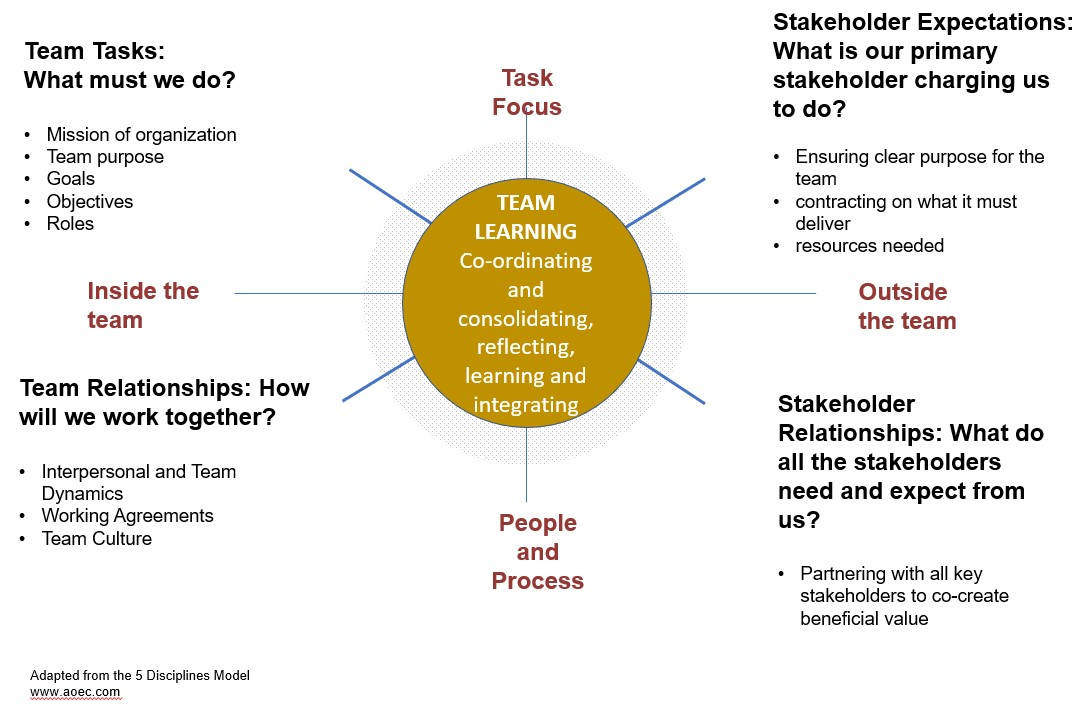TEAM COACHING
Transform Your Organization
Have you been investing in leadership and team development, yet feel your team or organization is still not functioning as well as it could be? Team coaching may be the missing piece in building your organization’s success.
What is the Difference Between Team Building and Team Coaching?
Team Building
Team Building is often structured as a “one-time” experience offsite, lasting as little as a half-day to a couple days. Sometimes there may be quarterly to semi-annual follow-up on the work that was done at the offsite. While team building gives team members an important break from their daily routines and provides an opportunity to learn how to relate to one another or work together in new ways, the impact typically doesn’t stick when the team members are back in the “business as usual” setting.
Team Building helps team members know, understand and appreciate each other in ways that improve the working environment and improve the team’s effectiveness. Education and self- and group-awareness activities are usually a part of the agenda.
Sometimes in team building, the team works to map out specific team and organizational goals and objectives and a path for measuring success in meeting these goals.
Building (and re-building) the team to work better together is an important step and can be done even by organizations, boards, or teams on a limited budget.
Team Coaching
Team Coaching takes team and organizational success to a higher level. Team coaching takes a much more in-depth approach to developing and working with the team. It involves regular meetings over several months or even years with experienced team coaches.
It typically starts with a detailed discovery phase, which includes interviews and a team-level assessment (often a Team 360). We explore the current dynamics of the team: strengths and challenges; team relationships; team goals and effectiveness at meeting those goals. We also look at how the various stakeholders view the team’s effectiveness. Stakeholders can include the team leader, team members, direct reports, board members, vendors, suppliers, etc.
A plan is co-created based on the results of the discovery phase. It addresses the opportunities identified that will have the most impact moving the team forward. This “execution phase” of team coaching frequently combines several offsites, individual coaching for team members and/or team leaders, and coaching alongside the team in “business as usual” meetings.
Using this approach, new processes, habits and ways of relating can be developed and sustained over time as the coaches combine and integrate these new ways of working with the team and organization. The goal is for the team and/or organization to gain the skill of being “self-coaching”, one that has learned to implement these processes and behaviors on an ongoing basis.
At a later date, our coaches can return to perform another Team 360 to evaluate progress and assist with designing strategies for new goals.
This ongoing process is a key difference between Team Coaching and Team Building, and is the reason team coaching is more effective.
Systemic Team Coaching
Implementing Systemic Team Coaching can yield the most valuable results for any organization. Systemic Team Coaching techniques look at the broader system the team is functioning in and is responsible to: other teams in the organization, suppliers, customers and other stakeholders.
Systemic Team Coaching
A process of coaching the whole team both together and apart, over a designated period of time to enable it to:
- Align on common purpose
- Collaborate and learn across diversity
- Develop collective leadership
- Achieve performance objectives
- Effectively engage with their key stakeholder groups
- Jointly transform the wider business
(Leary-Joyce, Lines & Hawkins)
The Systemic Team Coaching Approach – the Five Disciplines **
The Prerequisites – Three Biggest Factors for Teams to Create Value
Clarity
Ensuring clarity from primary stakeholder (e.g., team leader, Executive Director, the CEO, the Board) on what is expected from the team.
Purpose
Creating a unique core purpose for the team; identifying what success looks like.
Healthy Culture
Building working agreements and healthy team culture by creating psychological safety on the team, positive accountability, and understanding of different members’ interpersonal styles.
The Real Impact is Achieved When:
Collaboration
The team effectively engages and partners with all key stakeholders to ensure that it is delivering value to the organization; this reduces siloes and enables the organization not to function as separate “highly effective” units but as an organization that is highly collaborative for overall organizational success.
Core Learning
The team and the organization build in core learning as a key to organizational success, so that each team is reflecting on what went well, what improvements can be made, and the organization becomes one that prioritizes feedback, learning, and growth.
** Peter Hawkins, Professor of Leadership at Henley Business School University
Contact us if your team is struggling with:
- Working together effectively to deliver on the business goals of the organization
- Ineffective communication styles
- Difficulty getting along with others
- Difficulty working well across the organization
- Challenges with accountability for leaders and team members
- Conflicts between work and personal life
- Lack of alignment between the goals of individual leaders in their functional areas and overall organizational goals

